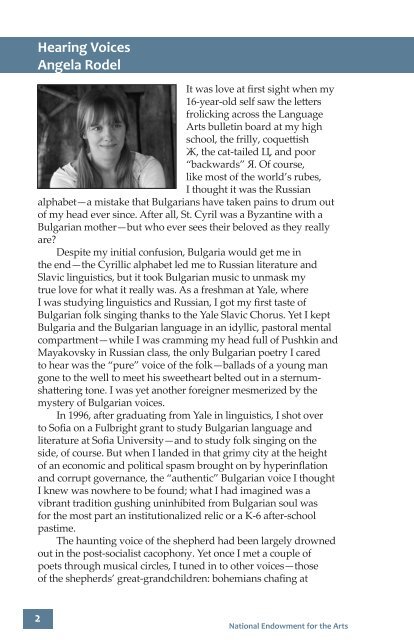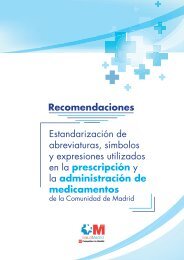lKd7nD
lKd7nD
lKd7nD
Create successful ePaper yourself
Turn your PDF publications into a flip-book with our unique Google optimized e-Paper software.
Hearing Voices<br />
Angela Rodel<br />
It was love at first sight when my<br />
16-year-old self saw the letters<br />
frolicking across the Language<br />
Arts bulletin board at my high<br />
school, the frilly, coquettish<br />
Ж, the cat-tailed Ц, and poor<br />
“backwards” Я. Of course,<br />
like most of the world’s rubes,<br />
I thought it was the Russian<br />
alphabet—a mistake that Bulgarians have taken pains to drum out<br />
of my head ever since. After all, St. Cyril was a Byzantine with a<br />
Bulgarian mother—but who ever sees their beloved as they really<br />
are<br />
Despite my initial confusion, Bulgaria would get me in<br />
the end—the Cyrillic alphabet led me to Russian literature and<br />
Slavic linguistics, but it took Bulgarian music to unmask my<br />
true love for what it really was. As a freshman at Yale, where<br />
I was studying linguistics and Russian, I got my first taste of<br />
Bulgarian folk singing thanks to the Yale Slavic Chorus. Yet I kept<br />
Bulgaria and the Bulgarian language in an idyllic, pastoral mental<br />
compartment—while I was cramming my head full of Pushkin and<br />
Mayakovsky in Russian class, the only Bulgarian poetry I cared<br />
to hear was the “pure” voice of the folk—ballads of a young man<br />
gone to the well to meet his sweetheart belted out in a sternumshattering<br />
tone. I was yet another foreigner mesmerized by the<br />
mystery of Bulgarian voices.<br />
In 1996, after graduating from Yale in linguistics, I shot over<br />
to Sofia on a Fulbright grant to study Bulgarian language and<br />
literature at Sofia University—and to study folk singing on the<br />
side, of course. But when I landed in that grimy city at the height<br />
of an economic and political spasm brought on by hyperinflation<br />
and corrupt governance, the “authentic” Bulgarian voice I thought<br />
I knew was nowhere to be found; what I had imagined was a<br />
vibrant tradition gushing uninhibited from Bulgarian soul was<br />
for the most part an institutionalized relic or a K-6 after-school<br />
pastime.<br />
The haunting voice of the shepherd had been largely drowned<br />
out in the post-socialist cacophony. Yet once I met a couple of<br />
poets through musical circles, I tuned in to other voices—those<br />
of the shepherds’ great-grandchildren: bohemians chafing at<br />
2<br />
National Endowment for the Arts



